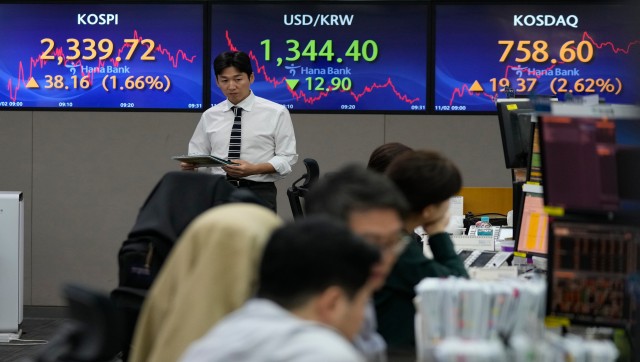On Friday, Chinese internet stocks fell on regulatory news, dragging Asian stocks lower for the year’s final full trading week, while the dollar trembled ahead of US inflation data, which is expected to validate expectations on rate cuts in 2024. After China issued a draft of laws imposing spending limits on gamers, MSCI’s broadest index of Asia-Pacific shares outside Japan gave up gains to trade flat. The index is down 0.2 per cent for the week. Netease was down 12 per cent, and Tencent was down 7 per cent, sending the Hang Seng down 0.4 per cent. Banking stocks helped Japan’s Nikkei gain 0.2 per cent. The euro surpassed $1.10. Outside of Asia, markets have been in a celebratory mood for weeks, as global inflation data has shown a slowdown and the Federal Reserve has suggested that it is done raising interest rates. Two-year US Treasury rates have fallen over 38 basis points in the last week and a half, and dipped 2 basis points overnight after third-quarter US core PCE inflation was revised down to 2 per cent. Markets are bracing for a negative surprise in the final crucial statistic before Christmas, the November personal consumption expenditure index, which is published at 1330 GMT and is expected to climb by 0.2 per cent month on month. “Analysts are confident it shouldn’t be higher than 0.2 per cent,” said National Australia Bank’s head of currency strategy Ray Attrill in Sydney. “Could we get 0.1 per cent? It’d probably take a 0.1 per cent to see and extension of the moves we have seen.” Overnight US stocks bounced back from a sudden slide at the end of Wednesday’s session and the S&P 500 rose 1 per cent. The index is within 2 per cent of its record high. S&P 500 futures dipped 0.1 per cent in Asia and Nike shares slid almost 12 per cent in after-hours trade after the company cut its sales forecast, blaming cautious consumers. European futures were flat. Oil is set for a weekly gain on nervousness about the security of Red Sea shipping, but prices fell overnight after Angola said it would quit OPEC, raising questions about the producer group’s efforts to limit global supply. Brent crude futures were up 58 cents to $79.97 a barrel in Asia trade on Friday, for a weekly gain of 4.5 per cent. Tale of two havens In currency trade the dollar has come under pressure from markets’ expectation of more than 150 bps of rate cuts in 2024. At $1.1002 the euro is up 1 per cent this week, even though a similar amount of cuts are priced in for Europe next year. The common currency is also up about 1 per cent against sterling, which fell sharply this week after a surprise dive in inflation. Sterling was set for its biggest weekly drop on the euro and against the Aussie dollar for three months. It last bought $1.2686 and traded at 86.71 pence per euro. The dollar index is down 0.7 per cent this week to 101.85. For the year it is down 2.4 per cent. Among G10 currencies the best performer of the year was the Swiss franc, up nearly 8 per cent on the dollar, while the yen’s 7.8 per cent drop made it the worst. NAB’s Attrill noted the mirror moves of the two so-called “safe haven” currencies underscored the overwhelming influence of the Bank of Japan’s (BOJ) monetary policy. It has stuck with negative interest rates while the rest of the world has hiked. Policymakers debated communication around an eventual exit from such settings in December, meeting minutes showed on Friday. But data showing a slowdown in the pace of Japan’s core inflation takes off some of the pressure to hurry. The dollar rose marginally to 142.43 yen on Friday. Gold is set to end the week and the year ahead, with a 12 per cent gain so far this year to $2,049 an ounce. Bitcoin is up 160 per cent this year to $44,114.
Outside of Asia, markets have been in a celebratory mood for weeks, as global inflation data has shown a slowdown and the Federal Reserve has suggested that it is done raising interest rates
Advertisement
End of Article


)

)
)
)
)
)
)
)
)



